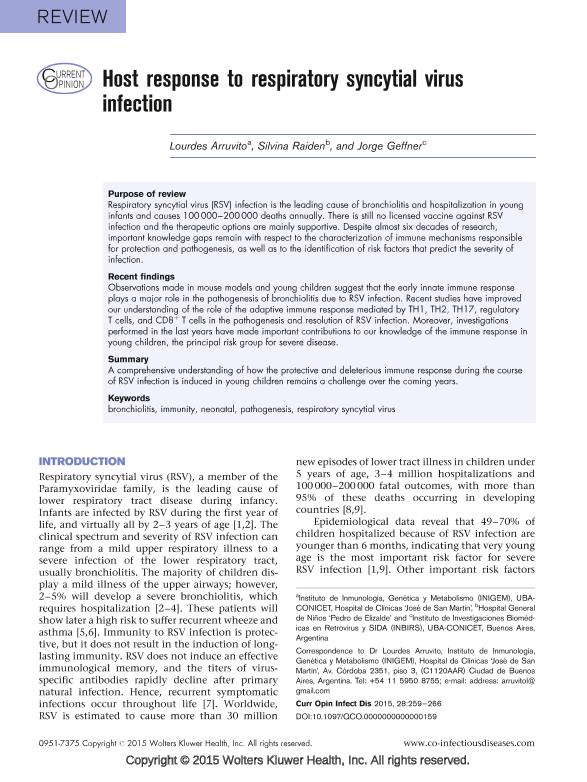Mostrar el registro sencillo del ítem
dc.contributor.author
Arruvito, Maria Lourdes

dc.contributor.author
Raiden, Silvina Claudia

dc.contributor.author
Geffner, Jorge Raúl

dc.date.available
2018-03-14T22:22:27Z
dc.date.issued
2015-06
dc.identifier.citation
Arruvito, Maria Lourdes; Raiden, Silvina Claudia; Geffner, Jorge Raúl; Host response to respiratory syncytial virus infection; Lippincott Williams; Current Opinion In Infectious Diseases; 28; 3; 6-2015; 259-266
dc.identifier.issn
0951-7375
dc.identifier.uri
http://hdl.handle.net/11336/38860
dc.description.abstract
Purpose of review: Respiratory syncytial virus (RSV) infection is the leading cause of bronchiolitis and hospitalization in young infants and causes 100 000–200 000 deaths annually. There is still no licensed vaccine against RSV infection and the therapeutic options are mainly supportive. Despite almost six decades of research, important knowledge gaps remain with respect to the characterization of immune mechanisms responsible for protection and pathogenesis, as well as to the identification of risk factors that predict the severity of infection. Recent findings: Observations made in mouse models and young children suggest that the early innate immune response plays a major role in the pathogenesis of bronchiolitis due to RSV infection. Recent studies have improved our understanding of the role of the adaptive immune response mediated by TH1, TH2, TH17, regulatory T cells, and CD8þ T cells in the pathogenesis and resolution of RSV infection. Moreover, investigations performed in the last years have made important contributions to our knowledge of the immune response in young children, the principal risk group for severe disease. Summary: A comprehensive understanding of how the protective and deleterious immune response during the course of RSV infection is induced in young children remains a challenge over the coming years.
dc.format
application/pdf
dc.language.iso
eng
dc.publisher
Lippincott Williams

dc.rights
info:eu-repo/semantics/openAccess
dc.rights.uri
https://creativecommons.org/licenses/by-nc-sa/2.5/ar/
dc.subject
Bronchiolitis
dc.subject
Immunity
dc.subject
Neonatal
dc.subject
Pathogenesis
dc.subject
Respiratory Syncytial Virus
dc.subject.classification
Inmunología

dc.subject.classification
Medicina Básica

dc.subject.classification
CIENCIAS MÉDICAS Y DE LA SALUD

dc.title
Host response to respiratory syncytial virus infection
dc.type
info:eu-repo/semantics/article
dc.type
info:ar-repo/semantics/artículo
dc.type
info:eu-repo/semantics/publishedVersion
dc.date.updated
2018-03-14T17:05:22Z
dc.journal.volume
28
dc.journal.number
3
dc.journal.pagination
259-266
dc.journal.pais
Estados Unidos

dc.description.fil
Fil: Arruvito, Maria Lourdes. Consejo Nacional de Investigaciones Científicas y Técnicas. Oficina de Coordinación Administrativa Houssay. Instituto de Inmunología, Genética y Metabolismo. Universidad de Buenos Aires. Facultad de Medicina. Instituto de Inmunología, Genética y Metabolismo; Argentina
dc.description.fil
Fil: Raiden, Silvina Claudia. Gobierno de la Ciudad de Buenos Aires. Hospital General de Niños Pedro Elizalde (ex Casa Cuna); Argentina. Consejo Nacional de Investigaciones Científicas y Técnicas; Argentina
dc.description.fil
Fil: Geffner, Jorge Raúl. Consejo Nacional de Investigaciones Científicas y Técnicas. Oficina de Coordinación Administrativa Houssay. Instituto de Investigaciones Biomédicas en Retrovirus y Sida. Universidad de Buenos Aires. Facultad de Medicina. Instituto de Investigaciones Biomédicas en Retrovirus y Sida; Argentina
dc.journal.title
Current Opinion In Infectious Diseases

dc.relation.alternativeid
info:eu-repo/semantics/altIdentifier/doi/http://dx.doi.org/10.1097/QCO.0000000000000159
dc.relation.alternativeid
info:eu-repo/semantics/altIdentifier/url/https://journals.lww.com/co-infectiousdiseases/pages/articleviewer.aspx?year=2015&issue=06000&article=00011&type=abstract
Archivos asociados
